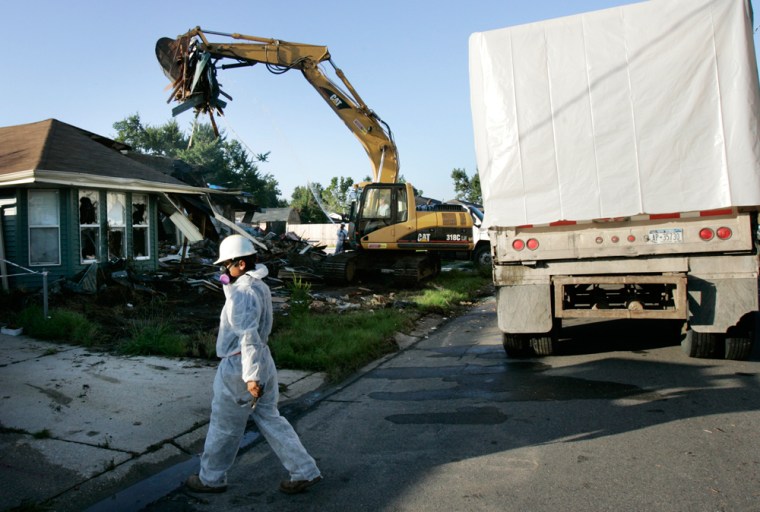Contractors hired to clean up after Hurricane Katrina are fuming over delays in getting paid by FEMA, and some fear the red tape will discourage companies from bidding on the big rebuilding projects that lie ahead for New Orleans.
One company claims it is owed about $150 million, and some contractors have walked off the job or gone to court to get the money they say they should have been paid for demolition and debris removal completed as much as a year and a half ago.
“You better hope another storm doesn’t hit you. You guys will be under water for six months,” said Zach Johnson, a Kansas City, Mo.-area contractor who is suing for about $1.7 million for tree-clearing in 2005. “Everybody got a bad taste in their mouth from Louisiana.”
Johnson called the whole situation “messed-up, frustrating, depressing” and said he will not pursue any more cleanup and recovery jobs in Louisiana.
“Oh, hell no. Nooo,” he said. “I won’t be back.”
Excessive delays
In some cases, cleanup contractors were hired by New Orleans-area parishes on the understanding the Federal Emergency Emergency Management Agency would cover most, if not all, the costs.
Contractors must submit their bills to the local governments that hired them. Then the bills have to be sent to the state for approval, after which they are forwarded to FEMA for review. FEMA is responsible for releasing the money back down the chain.
FEMA said slow payments often stem from incomplete paperwork submitted by the contractors and parishes. The agency said it is trying to protect the taxpayer by making sure that the government is not overpaying and that the work was performed as promised.
“We’ve done our part,” spokesman Andrew Thomas said.
The agency said it could not immediately put a total value on delayed payments in the New Orleans region.
In hard-hit St. Bernard Parish, local officials fear the slow-pay reputation will discourage contractors from bidding on the next major phase — the major reconstruction projects involving roads, sewers, schools, and police and fire stations.
Discouraged bidders
The situation is so bad, officials said, that bidders are tough to find for demolition and debris-removal work that remains nearly two years after the storm.
“It’s slowing us down, limiting the amount of contractors that will bid and costing us more,” said St. Bernard Parish Councilman Joey DiFatta. “This is effectively stopping the recovery.”
Local officials said one big reason for the delays is that FEMA underestimated cleanup costs. St. Bernard, for example, is appealing four projects the FEMA valued at nearly $9.3 million but the parish says are worth $16.5 million.
“It’s been a nightmare,” said Amy Blanchard, finance director for St. Bernard Parish.
The city of New Orleans let the Army Corps of Engineers handle contracts for storm cleanup and deal with FEMA, and the Corps said it has seen few disputes with contractors. But St. Bernard, Washington and St. Tammany parishes handled contracting themselves, and are now caught up in red tape.
It is not unusual for federal contractors to have to wait a few months for initial payments. But the delays here have been “very excessive, with no answer in sight for when they’re going to get paid,” said Ken Naquin, chief executive of the Louisiana Associated General Contractors.
Contractor Lawrence Green said he is owed about $150 million for demolition and debris and sewage hauling in St. Bernard Parish. At one time, he said, his crews stopped picking up debris. They later resumed work.
“Our profits look great on paper, but you have to collect the money,” he said.
Slow rebuilding
Cash-strapped St. Bernard and other parishes fear they could be saddled with millions of dollars in costs if FEMA does not pay.
St. Bernard remains largely in ruins and has only about half the annual $50 million budget it had before Katrina. Warped streets wind through neighborhoods, and slabs sit where houses once stood. Waste must be hauled out because the sewers have not been fixed.
FEMA has estimated it will cost $891 million to repair Katrina’s damage in St. Bernard.
Omni Pinnacle LLC, a contractor for debris clearing in St. Tammany Parish, is suing for more than $16 million it claims it is owed. St. Tammany also has been sued for more than $9 million by Shaw Environmental & Infrastructure Inc., which was hired to monitor work done by contractors.
The parish itself is suing, too, claiming FEMA has not approved about $3 million to clear clogged canals.
